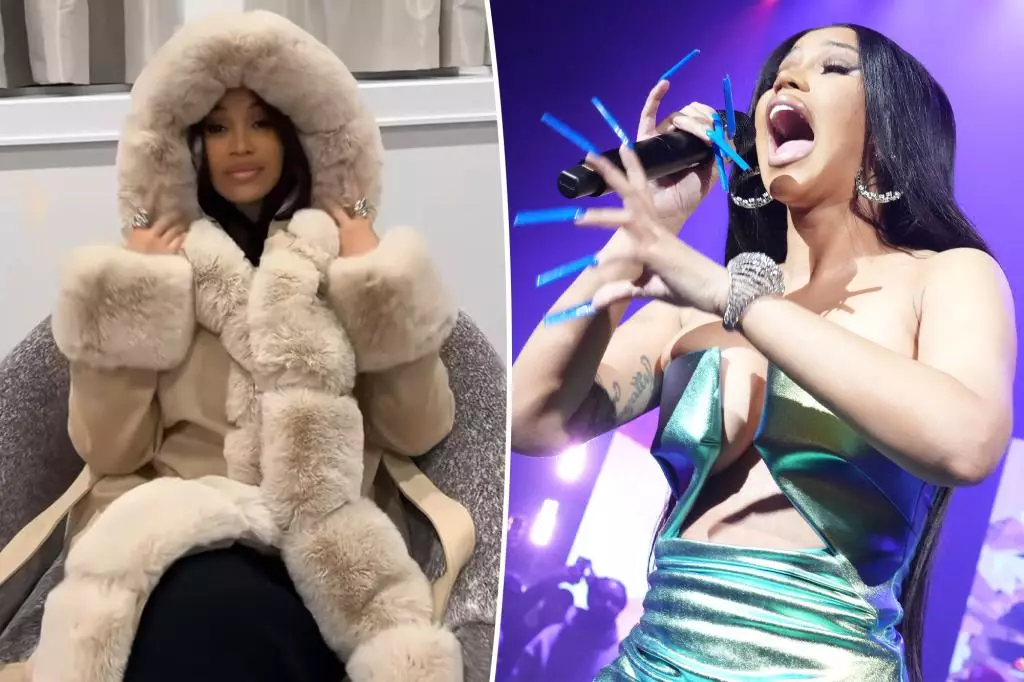Cardi B, the Grammy award-winning rapper and cultural phenomenon, recently found herself at the center of an online firestorm concerning her financial status after partnering with fast fashion retailer Shein. This partnership raised eyebrows among fans accustomed to seeing Cardi adorn herself in high-end labels. The juxtaposition of her luxurious style against a budget-friendly brand led to speculation regarding her financial well-being, prompting Cardi to set the record straight.
Social media is often a double-edged sword for celebrities, providing a platform for engagement while also serving as a breeding ground for scrutiny and rumors. After Cardi shared a sponsored advertisement featuring Shein, many fans questioned her choice, especially given the rapper’s history of flaunting designer pieces from luxury brands like Hermes and Chanel. These initial remarks fueled speculation among fans that Cardi might be struggling financially or “surviving” on sponsored deals rather than genuinely thriving.
In response to the backlash, Cardi employed a direct and unapologetic approach. In a voice memo shared on X, she reassured her fans of her financial stability, indicating that the idea of her subsisting on brand deals was far from the truth. Cardi suggested that her financial capacity is immense, asserting, “I could wake up tomorrow and sign a contract, and have half of $65 million—or half of $70 million—in my bank.” This declaration aimed to dispel doubts surrounding her financial footing, emphasizing that her connection with Shein doesn’t indicate economic hardship but instead a strategy for leveraging diverse income streams.
The Reality of Celebrity Earnings
Many celebrities work tirelessly to maintain their public personas and financial health; Cardi is no exception. The rapper noted that her monthly expenditures hover around $3 million, which further amplifies the point that her lifestyle is not merely a result of occasional brand collaborations. Cardi also cited an ongoing negotiation for a tour deal reportedly worth $65 million, with compensation of $1 million per show planned to ensure profitability. Such figures highlight the vast earnings potential that celebrities often possess, countering narratives suggesting that they depend solely on certain sponsorships for survival.
However, Cardi’s discerning approach to her career decisions also reflects a calculated business savvy. She explained that she wishes to wait until she can announce her upcoming album before finalizing any tour deals. This decision aligns with industry best practices, wherein artists often maximize their leverage by linking upcoming releases with promotional tours. Cardi’s strategy demonstrates a keen understanding of the entertainment landscape, wherein timing and anticipation can significantly impact financial agreements.
As Cardi faced criticism for incorporating lower-priced items into her promotional mix, fans were divided in their opinions. Some defended her by recalling her initial rise to fame, where she often collaborated with brands like Fashion Nova. This defense reflects a larger narrative about accessibility in fashion, where even high-profile individuals, such as Cardi, have aligned themselves with budget-friendly choices in the past, showcasing that style can indeed come at various price points.
Moreover, Cardi’s choice to endorse Shein might also be viewed as an intentional move to bridge the gap between high fashion and fast fashion. By engaging with the accessible fashion community, she can reach a wider audience, potentially influencing consumer behavior while maintaining her luxurious image. This duality—a high-end celebrity promoting affordable fashion—unveils the complexities associated with brand collaborations today.
In a world where social media dictates public perception, Cardi B’s recent experiences underscore the necessity for celebrities to navigate their narratives actively. Her robust response to fan scrutiny illuminates not only her financial security but also her understanding of the industry’s dynamics. Rather than succumbing to public pressure, Cardi has chosen a path of strategic financial management that intertwines her artistic ambitions with savvy brand partnerships.
Ultimately, this situation serves as a reminder that wealth should not be solely defined by expenditures or brand choices but also by one’s ability to curate a multifaceted career that fosters both longevity and resilience in an ever-evolving landscape. Cardi’s story demonstrates that beyond mere appearances, the business of fame requires not only artistic talent but also shrewd financial acuity.

Leave a Reply